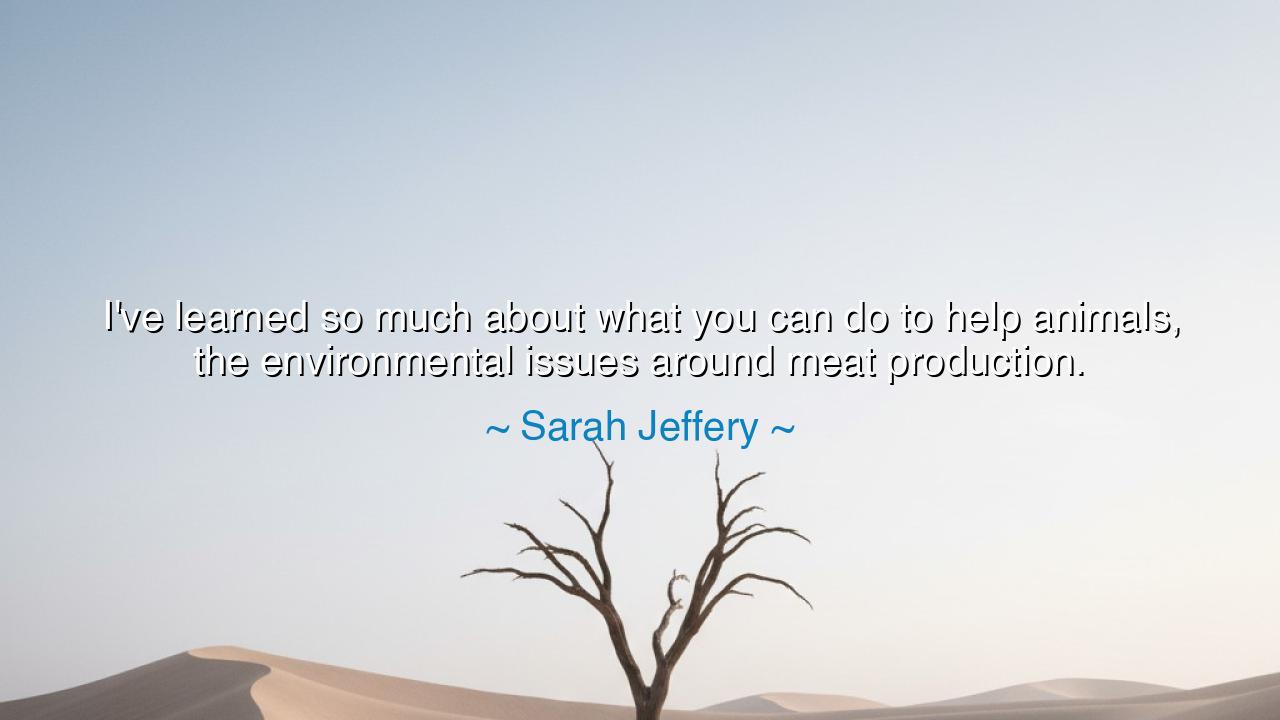
I've learned so much about what you can do to help animals, the
I've learned so much about what you can do to help animals, the environmental issues around meat production.






Hearken to the words of Sarah Jeffery: “I’ve learned so much about what you can do to help animals, the environmental issues around meat production.” Though spoken in simplicity, these words carry the weight of a revelation, for they remind us that the choices of the table are not small matters of appetite, but decisions that echo across forests, rivers, skies, and the lives of countless creatures. They speak of awakening, when the eyes of the heart are opened to the hidden costs of what we consume.
The mention of animals is not idle. From the earliest dawn of human memory, we walked beside them. They carried our burdens, guarded our homes, shared our fires, and even in their silence, offered companionship. Yet in the age of endless consumption, these companions have too often been reduced to numbers in vast factories, their lives shortened, their voices ignored. To learn what can be done for them is to recover a forgotten covenant—that mankind was not given dominion to destroy, but stewardship to protect.
Jeffery’s words also strike at the heart of the environmental issues surrounding meat production. For it is known that the raising of livestock consumes vast forests, devours rivers of water, and fills the skies with fumes that warm the earth. Once, the herds roamed with balance, guided by the rhythms of pasture and season. But now, the hunger of billions has turned balance into excess, and the earth groans beneath the weight of herds far greater than the land can sustain. To awaken to this truth is to see that the knife not only cuts flesh, but carves scars into the soil, the air, and the seas.
Consider the tale of Easter Island, where once great forests grew, sheltering birds and feeding people. The inhabitants, in their ambition, cut tree after tree to build and transport their monuments. At first, the island flourished; then, with no trees left, the soil eroded, the birds vanished, and famine devoured the people. Their story is a mirror to ours: for as we strip the earth of her forests to feed livestock, we too may awaken one day to find that our monuments of plenty have left us barren.
Yet Jeffery’s words are not despairing—they are filled with hope, for they say, “I’ve learned so much about what you can do.” This is the heart of the matter: knowledge is not a curse but a gift. To learn is to begin the journey toward change. If one can eat less meat, support humane farming, or choose plant-based foods, one begins to tip the scales toward mercy. Small acts, multiplied by millions, can reshape the destiny of both the animals and the environment.
The lesson for us is clear: what we place upon our plates is not only nourishment for our bodies, but also a declaration of our values. To eat mindfully is to live with justice. To reduce what destroys and to increase what sustains is to walk in harmony with the earth. Every meal becomes a choice between waste and wisdom, cruelty and compassion, exploitation and reverence.
Therefore, let each listener take up this teaching: begin where you can. Learn, as Jeffery has learned. Replace one meal of meat with plants. Support farmers who treat their animals with dignity. Speak to others of the environmental issues hidden in plain sight. For though no single person can change the whole world, each soul can change their corner of it. And when many corners are transformed, the world itself is renewed.
Thus, let this quote be remembered not as a passing reflection, but as a torch. Carry it forward, and know this truth: in every bite lies a choice, in every choice lies a legacy, and in every legacy lies the power to heal both the creatures who walk beside us and the earth that carries us all.






AAdministratorAdministrator
Welcome, honored guests. Please leave a comment, we will respond soon